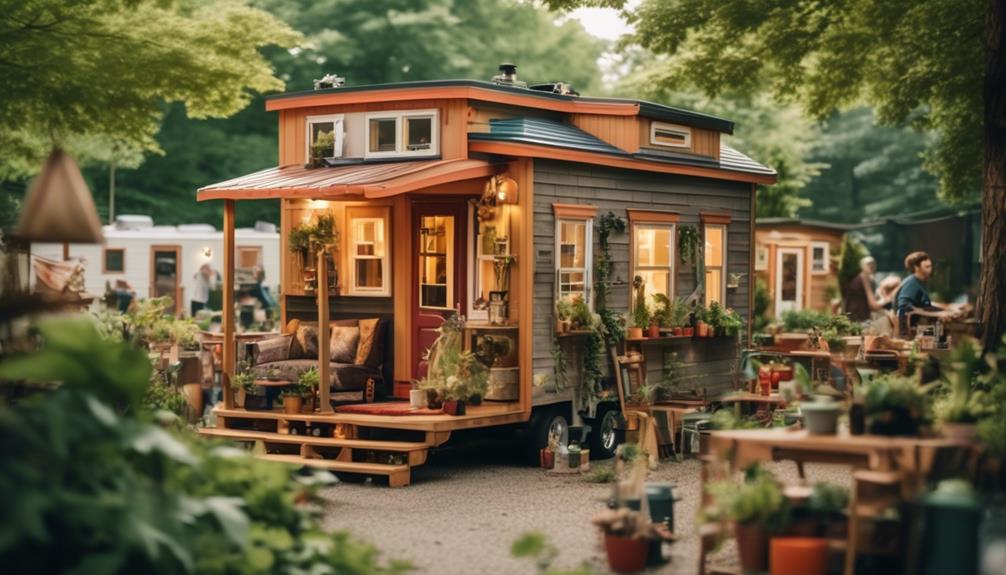The tiny house revolution has taken hold across the nation, offering a unique and sustainable housing alternative for those seeking a simpler lifestyle. New York, with its bustling cities and diverse landscapes, has not been immune to this movement.
But what exactly does the tiny house trend look like in the Empire State? In this article, we will delve into the legalities and regulations surrounding tiny houses in New York, explore the costs and financing options, highlight tiny house-friendly cities, and introduce reputable builders who specialize in these compact dwellings.
Furthermore, we will uncover a world of tiny house trailer dealers and communities that cater to the needs of this growing community. Curious to know more? Let's take a closer look at the tiny house revolution in New York.
Key Takeaways
- Tiny houses are legal in New York, but regulations vary by county and municipality.
- The cost of a tiny house in New York ranges from $50,000 to $140,000, and factors such as size and customization influence the cost.
- Buffalo, Long Island, Saugerties, and Woodgate are considered to be tiny house-friendly cities in New York, with zoning regulations and building codes that accommodate tiny houses.
- There are several reputable tiny house builders in New York, offering custom-built homes with different price ranges and customization options.
Legality and Regulations
The legality and regulations surrounding tiny houses in New York vary by county and municipality, making it important to research and comply with local zoning and building codes.
Zoning requirements dictate where tiny houses can be located and what they can be used for. Some areas may have minimum square footage requirements for dwellings, which could impact the design and layout of a tiny house.
Building codes ensure that tiny houses meet safety standards and include regulations for electrical, plumbing, and structural components. It is crucial to understand and adhere to these regulations to avoid legal issues and ensure the safety and functionality of the tiny house.
Cost and Financing
The cost of building and financing a tiny house in New York can vary depending on factors such as size, materials, amenities, and customization. On average, the cost of a tiny house in New York ranges from $50,000 to $140,000. Building a tiny house yourself can help save on costs, but it is important to budget for additional expenses such as land, utilities, and permits. Financing options for tiny houses may be available, but it is important to research and compare different options to find the best fit for your needs.
Pros of building a tiny house in New York include the potential for lower living expenses, reduced environmental impact, and the opportunity to live a more minimalist lifestyle. However, there are also cons to consider, such as limited space and the challenges of finding suitable land and navigating local regulations.
Despite these challenges, tiny houses offer an innovative and alternative housing option for those looking for a more sustainable and cost-effective way of living in New York.
Tiny House-Friendly Cities

Buffalo, Long Island, Saugerties, and Woodgate are among the tiny house-friendly cities in New York. These cities have embraced the tiny house movement by implementing zoning regulations and building codes that accommodate tiny houses. They may even have designated areas or communities specifically for tiny houses.
The benefits of tiny house living, such as reduced environmental impact and lower costs, have attracted the attention of these cities. By allowing tiny houses, they are encouraging innovative and sustainable housing options for their residents.
However, it is important to note that regulations for tiny houses vary by county and municipality in New York. Therefore, individuals interested in living in a tiny house should thoroughly research and comply with local zoning and building codes to ensure compliance and a smooth transition to tiny house living.
Tiny House Builders
There are several reputable tiny house builders in New York that offer a range of custom-built options to suit individual preferences and budgets. These builders have years of experience and are known for their craftsmanship, attention to detail, and commitment to customer satisfaction. They understand the importance of customization options and strive to create unique tiny homes that reflect the personality and style of their clients. Additionally, energy efficiency is a top priority for these builders, as they incorporate sustainable materials and innovative technologies to maximize energy savings. By focusing on energy-efficient design and construction methods, these builders help homeowners reduce their carbon footprint and lower their utility bills. The table below provides a summary of some of the prominent tiny house builders in New York:
| Builder Name | Location | Specialization |
|---|---|---|
| Willowbee Tiny Homes | Saugerties, NY | Custom-built, fine craftsmanship, unique personalization |
| Tiny Hampton Homes | Southampton, NY | Energy-efficient, luxurious upgrades |
| Bear Creek Tiny Houses | Woodgate, NY | Full range of services including land development, custom log work |
| East End Tiny Homes | Long Island, NY | High-quality, affordable, environmentally friendly |
These builders offer different price ranges and customization options to cater to the diverse needs and preferences of tiny house enthusiasts in New York.
Tiny House Trailer Dealers and Communities

Continuing the exploration of tiny house options in New York, attention now turns to the availability of tiny house trailer dealers and communities in the state.
For those interested in building their own tiny house, Trailer Made is a nationwide trailer dealer that offers customizable options for tiny house trailers. Another option is P.J. Trailers, one of the largest trailer manufacturers in the U.S. and Canada, based in Newton, NJ.
In terms of tiny house communities, Boiceville Cottages in Brooktondale is a vibrant community with 140 tiny houses. Additionally, rural locations in New York welcome tiny house living and may offer land rentals. Some counties even allow tiny houses as backyard additional dwelling units (ADUs).
It is crucial to check with local municipalities to ensure compliance with regulations.
Frequently Asked Questions
What Are the Restrictions on Parking and Placement of Tiny Houses in New York?
Parking regulations and zoning restrictions for tiny houses in New York vary by county and municipality. It is important to research and comply with local regulations, which may include requirements for parking spaces, setbacks, and designated areas for tiny houses.
Are There Any Tax Incentives or Benefits for Owning a Tiny House in New York?
Tax incentives for owning a tiny house in New York are not widely available. However, some counties may offer zoning regulations that allow for reduced property taxes or exemptions for tiny houses. It is important to research local regulations for specific benefits.
How Do I Find Available Land or Communities That Allow Tiny Houses in New York?
Finding land for tiny houses in New York can be achieved by researching rural locations, checking with local municipalities for ADU regulations, and exploring tiny house communities like Boiceville Cottages.
Are There Any Grants or Funding Options Specifically for Building or Purchasing a Tiny House in New York?
There are currently no specific grants or funding options specifically for building or purchasing a tiny house in New York. However, individuals may explore alternative financing options and research local regulations, zoning, building codes, and insurance requirements to ensure compliance and affordability.
Can I Live in a Tiny House on Wheels Year-Round in New York, or Are There Limitations on How Long I Can Stay in One Place?
Limitations on year-round living in a tiny house on wheels in New York may be subject to zoning laws. It is important to research and comply with local regulations, which vary by county and municipality.
Conclusion
In conclusion, the tiny house revolution in New York offers individuals a unique and sustainable housing option. While there are regulations and costs to consider, there are also opportunities to explore tiny house-friendly cities and work with reputable builders.
Additionally, trailer dealers and communities cater to the needs of tiny house enthusiasts. Embracing the tiny house movement in New York allows individuals to downsize and experience the benefits of a simpler, more environmentally conscious lifestyle.

